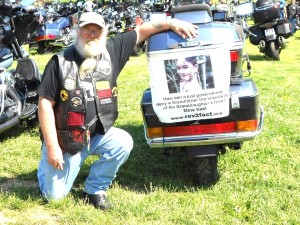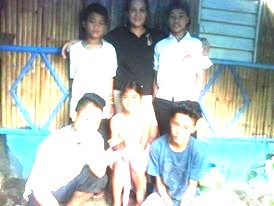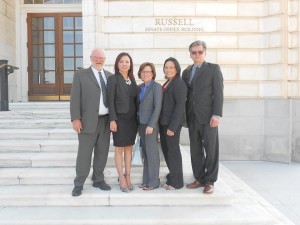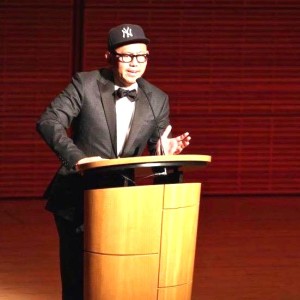Lensman helping to reunite left-behind Amerasians with dads
SAN FRANCISCO – A Filipino photographer’s book project is helping efforts to change the lives of many Amerasians who were left as children in the Philippines after the American military bases were closed more than two decades ago.
Photographer Enrico Dungca’s book, “The Forgotten Americans,” documents the plight of Amerasians who are searching for their American fathers. (The New York Foundation for the Arts is now reviewing the book.)
MAPP International Productions, an organization that supports artists in “advancing appreciation of diverse cultures and perspectives,” invited Dungca on May 25 last year to a symposium on artistic and creative projects “dedicated to paternal inspirations.”
He was one of four artists who spoke about the “lost of fatherhood,” which contributed to their current projects. The event was held at the David Rubenstein Atrium in Lincoln Center, New York, and was moderated by Ilyasah Shabazz, daughter of Malcolm X.
Former US serviceman John Haines, from La Crosse, Wisconsin, has been inspired by Dungca’s work. In 2014 Haines, who was in US Navy stationed at Subic Naval Base, found Dungca’s photos in the Amerasian Group in Facebook. The two have kept in touch since then.
“I watched Enrico Dungca’s Amerasian project and I saw the faces that should have been included,” Haines says. “The faces that failed to appear in his collection were the faces of the proud and often forgotten veterans who fathered these children.”
Haines, a veteran, said, “This law, the Amerasian Homecoming Act, has a harmful effect on me. Congress continues to call this issue an ‘immigration issue.’ I see it as a veteran’s issue.”
Haines said he has networked with a number of other veterans who have “a huge hole in their hearts as they search for a way to be reunited with their own children.” He is working with Amerasians Without Borders to push for the amendment of the US Immigration and Nationality Act to facilitate the immigration of children sired and left abroad by US servicemen.
Father and child reconnection
Haines’ own reconnection with the daughter he left behind in the Philippines and his effort to bring her to the States led to his frustration with Amerasian Homecoming Act, which currently excludes Filipino children left behind by US servicemen.
Jannette San Buenaventura Haines, 42, of Camarines Sur, had been looking for her father since she was eight years old. Due to poverty, her mother left her to the care of her grandmother; but eventually, Jannette ended up in an orphanage where she stayed from 1982 to 1985.
Jannete had a picture of her father, John Thomas Haines when he was 19. A retired Filipino soldier helped her to send a letter to the US Embassy in Manila, but it was mailed back to her. Unfortunately, the picture, the only proof that she has an American father, was gone.

John Haines uses the photo of his granddaughter to push for the rights of Amerasians to get US citizenship.
She did not give up, although the US Embassy kept sending her letters that Haines might be dead and could no longer be found. In 2011, when the Internet and Facebook became more accessible in the Philippines, Jannette found Haines.
“There were many John Thomas Haines, but when I saw him with eyeglasses, I really shouted. It’s him, it’s him! I knew it because one of my sons looks like him,” Jannette says.
In November 2011, she started sending messages to Haines, telling him that she was her daughter. Haines thought it was a scam. Having been diagnosed with stage-four lymphoma with metastasis to the liver and complications with Hepatitis C, he was getting chemotherapy. Haines partially blamed his physical and mental state for his skepticism about Jannette’s claim.
Haines recalls that the young woman was persistent and knew things that he also knew. Still, it took two years before he finally answered her messages.
Haines was a young sailor when he was stationed in Olongapo. He met “Norma” at Pals Bar in Olongapo. “Chief Boyer told me to find a girlfriend and rent a house. I really liked her so we rented a house and stayed together whenever the ship was in port,” Haines narrates.
Judging from Jannette’s birth date, September 29, 1975, Haines assumed that Norma got pregnant on his last trip to the Philippines.
“My mother said that they always fought, to the point that she hurt Daddy. Mama is older than him. Maybe that is the reason why they separated,” Jannette says. Norma is now living in Guam with an American husband.
DNA Testing
“As my health improved, I asked Jannette if she would agree to a DNA test. She consented and I made arrangements to have the test done by an internationally accredited lab in the Philippines,” Haines says.
Jannette received money from Haines and on June 12, 2013, she went to St. Luke’s Hospital and got a DNA, which was sent to the United States. The DNA result was positive. Haines proudly announced that he has grandchildren in the Philippines. Ecstatic with the result, Haines, immediately contacted a lawyer to bring his daughter and grandchildren to America.

Jannette (middle, top row) with her children (left to right: Carlo Rossie, Klauz Jade, Daniella Shayne, John Thomas and Christian Haines Dela Cruz)
Haines met with Glorify Lopez, an attorney with the Desmond Murphy law firm in Madison, Wisconsin, and provided her with information. But on the next appointment Lopez informed him that the Philippines was not included in the Amerasian Homecoming Act. She said media attention was needed to get the law changed.
Since then, Haines has been helping Jannette financially, especially for the schooling of his grandchildren. But for Jannette, Haines’ acknowledgment and show of love are more than enough. She is also very thankful that her five children have a future, unlike her who was deprived of education and a father’s love for a long time.
Rep. Ron Kind’s bill HR 5742
Determined to change the status of his daughter, Haines drove from La Crosse to Washington, DC to hand deliver a four-page document to his congressman, Rep. Ron Kind of the 3rd Congressional District. John started showing up at Rep. Kind’s town hall meetings and other events.
In July 21, 2016, Kind sponsored HR 5742 to amends Immigration and Nationality Act to provide for the admission of certain sons and daughters of citizens of the United States, who served on active duty in the Armed Forces of the United States abroad.
Among the prominent provisions of the bill is the acceptance of the DNA as proof for immigration purposes that the child is indeed the son/daughter of the petitioner.
“As veterans, all we are asking for is the same rights, freedoms and privileges for our descendants that we gave yours. What if even one of these Amerasians has his/her daddy’s name on the wall? It is my duty to fill my fallen brother’s shoes. It should be Congress’ duty also. In the military we have a code of honor. It says ‘no man left behind, nor any part of him,’” says Haines.
Dreams to fulfill
Dungca says that one of the reasons why the Philippines was not included in the Amerasian Homecoming Act was because the children were born as a result of “illegal activities,” but this should not be a used as a basis for discrimination.
Haines echoes the sentiment, saying that he finds it offensive when it is implied that his girlfriend (Jannette’s mother) was “just a whore.”

John Thomas Haines (right) with members of Amerasians Without Borders at the US Senate to lobby for the passage of HR 5742.
With the group Amerasians Without Borders, Dungca, Haines and a number of Vietnamese-Americans are lobbying for the passage of the bill into law to fulfill the dream of fathers and children to be reunited.
To Filipinos who are still looking for their fathers, Jannette says to never lose hope and faith because these made her find her father. Now, she is hoping that they will be reunited to let John feel the love of a daughter and his grandchildren.
“As more and more veterans of the Vietnam War die, the problem facing their Amerasian children grows more urgent by the day and needs to be addressed quickly. Yes, I want this bill to solve my need to bring my daughter to my country, but more than that, I want the Vietnamese Amerasian problem to be solved in the process,” says Haines.
Dungca has this to say: “To my fellow Filipino photographers, feel the heart of our fellowmen. Hear the voices of the voiceless. Photography is a powerful tool. Sometimes words are not needed to share a story. Listen to our countrymen. The camera could be your pen. Share your story to the world. The Filipino story.















